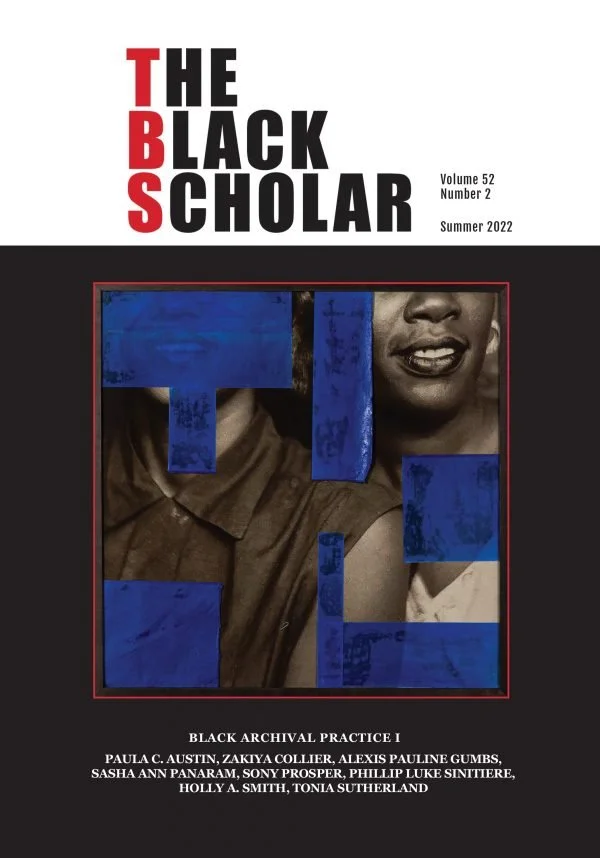In 2019, Tonia Sutherland and I began imagining a conversation between Black studies and archival studies to affirm everyday Black memory work as archival practice as these spaces have too often been seen as mutually exclusive. Recognizing The Black Scholar as the leading journal in Black studies research and dialogue in the U.S., we proposed a special issue on Black Archival Practice. In 2021 we began inviting work that centers Black archival epistemologies in order to contend with the anti-Blackness of archival studies and create the conditions of possibility for more robust discourse around archival practice in Black scholarship.
Putting scholars from Archival Studies, African American Studies, the Digital Humanities, and other scholarly and professional disciplines in conversation with one another around the topic of Black archival practice, this themed double issue asks us to consider questions such as: What constitutes a Black archive? And what constitutes Black archival practice-inside the archives and in the spaces that exceed it?
Black Archival Practice II is a collection of reflections, celebrations, and prefigurations of and for the past, present, and future of the Black lives in the Archive(s). The essays in this issue center the work of Black women in the archive(s) as archivists, researchers, historical subjects, artists, and mothers as a way to expand current understandings of how Black archival practices get imagined, contested, and negotiated within traditional archival spaces and in spaces intentionally coded as Black.
These essays speak to the complexities of documenting Black women’s intellectual histories through Queen Mother Audley Moore’s Archives, Samaria Rice’s Black maternal archival praxis and the memorialization of Black death, an exploration of collective ethics of care in Black archival practices via the history of a community-led rediscovery of the free Black community of Weeksville and a Brooklyn, NY-focused digital humanities project, an intimate exploration of “hoarding” and home archives in Black communities through an atypical multi-generational collection, the use of dirt as enslaved Afro-Texan women’s testimony, and the application of Black feminist witnessing to reveal racial violences obscured in legal archives.
This issue on Black Archival Practice is a collection of reflections, celebrations, and prefigurations of and for the past, present, and future of the Black lives in the Archive(s). The essays in this issue center Black(end) archival knowledges as a way to expand current understandings of how Black archival practices get imagined, contested and negotiated within traditional archival spaces and in spaces intentionally coded as Black.
These essays speak to transformation through witnessing and testimony in the archives, Black women stewarding collections of their own experiences, Audre Lorde’s queer and deviant library science practices, the questioning of what we know and from where we know it in Octavia E. Butler’s archival practices, poet Arna Bontemps’s Black archival labor in the Fisk University W.E.B. DuBois collection, the use of narrative prose to probe the limits of care and affection in undoing archival harm, and an interview with Black Bottom Archives Director Paige “PG” Watkins that thoughtfully engages abolitionist organizing with Black memory work.
The Black Scholar
Co-Editor, Special Issue on Black Archival Practice
Untitled (Blue), 2019 by Alanna Fields
Cover art
Can We Pretend, 2022 by Alanna Fields
Cover art

